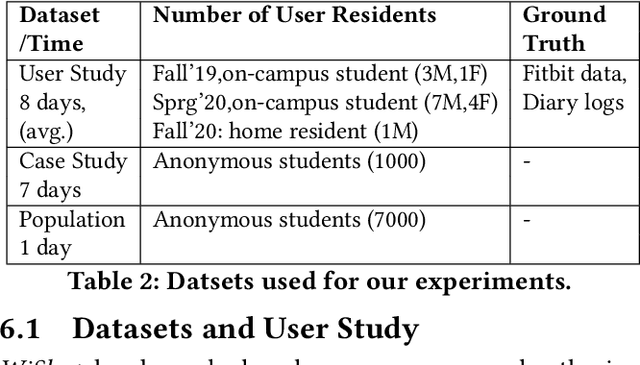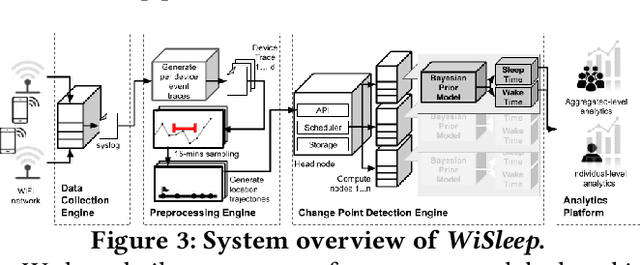Rajesh Balan
SleepMore: Sleep Prediction at Scale via Multi-Device WiFi Sensing
Oct 28, 2022Abstract:The availability of commercial wearable trackers equipped with features to monitor sleep duration and quality has enabled more useful sleep health monitoring applications and analyses. However, much research has reported the challenge of long-term user retention in sleep monitoring through these modalities. Since modern Internet users own multiple mobile devices, our work explores the possibility of employing ubiquitous mobile devices and passive WiFi sensing techniques to predict sleep duration as the fundamental measure for complementing long-term sleep monitoring initiatives. In this paper, we propose SleepMore, an accurate and easy-to-deploy sleep-tracking approach based on machine learning over the user's WiFi network activity. It first employs a semi-personalized random forest model with an infinitesimal jackknife variance estimation method to classify a user's network activity behavior into sleep and awake states per minute granularity. Through a moving average technique, the system uses these state sequences to estimate the user's nocturnal sleep period and its uncertainty rate. Uncertainty quantification enables SleepMore to overcome the impact of noisy WiFi data that can yield large prediction errors. We validate SleepMore using data from a month-long user study involving 46 college students and draw comparisons with the Oura Ring wearable. Beyond the college campus, we evaluate SleepMore on non-student users of different housing profiles. Our results demonstrate that SleepMore produces statistically indistinguishable sleep statistics from the Oura ring baseline for predictions made within a 5% uncertainty rate. These errors range between 15-28 minutes for determining sleep time and 7-29 minutes for determining wake time, proving statistically significant improvements over prior work. Our in-depth analysis explains the sources of errors.
* 29 pages, 24 figures, 14 tables
WiSleep: Scalable Sleep Monitoring and Analytics Using Passive WiFi Sensing
Feb 07, 2021



Abstract:Sleep deprivation is a public health concern that significantly impacts one's well-being and performance. Sleep is an intimate experience, and state-of-the-art sleep monitoring solutions are highly-personalized to individual users. With a motivation to expand sleep monitoring at a large-scale and contribute sleep data to public health understanding, we present WiSleep, a sleep monitoring and analytics platform using smartphone network connections that are passively sensed from WiFi infrastructure. We propose an unsupervised ensemble model of Bayesian change point detection to predict sleep and wake-up times. Then, we validate our approach using ground truth from a user study in campus dormitories and a private home. Our results find WiSleep outperforming established methods for users with irregular sleep patterns while yielding comparable accuracy for regular sleepers with an average 79.5\% accuracy. This is comparable to client-side based methods, albeit utilizing only coarse-grained information. Finally, we show that WiSleep can process data from 20,000 users on a single commodity server, allowing it to scale to large campus populations with low server requirements.
 Add to Chrome
Add to Chrome Add to Firefox
Add to Firefox Add to Edge
Add to Edge